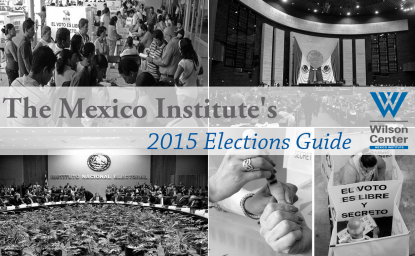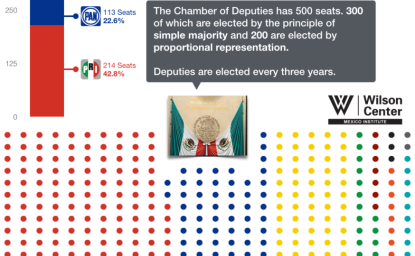Mexico’s political elite has been roiled in recent months by a succession of corruption and conflict of interest scandals. The “Casa Blanca” scandal involving the First Lady, Angélica Rivera, followed closely by similar incidents involving the Finance Minister, the President himself, one of his closest advisors, and most recently the head of the CONAGUA (the national water commission), have all raised public awareness and criticism of the prevalence of graft within the Mexican political system. It is not only the government that has been affected, as both the PAN and PRD opposition parties have been tainted by scandals of their own. What’s more, the divided nature of the opposition parties has hindered their power to take advantage of the recent crisis of legitimacy faced by the government.
However, in the eyes of the electorate, corruption has emerged as a key topic in the electoral campaigns. Social media in Mexico has been awash with the issue, and a group of think tanks and NGOs, including IMCO and Transparencia Mexicana, have launched a collaborative effort calling on Mexican politicians to make a full declaration of their income, holdings, and interests. Thus far, only 19 candidates to congresses and municipalities have complied and only 3 candidates to governorships.
Beyond the headlines, however, it is important to remember where the debate is currently and what the parties are proposing in their electoral platforms. Last February, the Chamber of Deputies approved constitutional amendments to create the National Anticorruption System. Some notable changes are: 1) Senate ratification for the Secretary of Public Administration, 2) expand the abilities of the Superior Audit Office (ASF) to monitor expenditures in real time in contrast with lag-monitoring, 3) increase sanctions for public servants accused of corruption acts and include sanctions for private entities involved in those corruption acts, 4) direct appointment of the Chamber of Deputies of the internal control offices for autonomous bodies, among others.
In March, the Senate began the analysis and debate on the amendments submitted by the Deputies. Last week, Senate leaders met to determine the legislative objectives towards the end of the regular period and among them is the final approval of these constitutional changes, a situation that will likely happen in the next few weeks with the recent approval of the freedom-of-information law. However, with only just over two weeks left for the current legislative period in Congress, there are some issues that the next Chamber of Deputies (which will begin in September) will likely be in charge of debating and approving.
The Center for Social Studies and Public Opinion of the Chamber of Deputies recently conducted a survey on the National Anticorruption System, which showed that 85% of citizens believe there is a big problem of corruption in the country, contrasting with only 7% indicating that there is a strong sense of justice in Mexico; in fact, 57% believe that corruption has increased in the last 12 months. Only 45% know or have heard of the National Anticorruption System, but 73% indicate that the country needs legislation on that matter. Finally, of the measures in the new law, the following methods to punish acts of corruption were ranked the highest: 1) punish acts of corruption both for public servants and for private entities, 2) the creation of a National Committee, including civil society, to follow up on corruption issues, 3) expand the powers of the Superior Audit Office, and 4) prosecute and punish acts of corruption, even if no formal complaint is filed.
With this as background, the legislative proposals of the main political parties for this 2015 election are:
PAN
•The party is proposing further actions to consolidate the current law being debated in the Senate. Specifically, the PAN proposes the creation of citizen observatories to follow up on corruption and accountability issues and expand the powers of local comptrollers in order to fight corruption in the local-levels.
• In addition, the party proposes strengthening the role of municipalities to meet public safety needs and establish coordination schemes with state and federal authorities, and also to expand the powers of the ASF to oversee federal contributions to states and avoid debt growth.
PRI
• The party aims to strengthen the powers of the ASF in the monitoring and control of public spending and strengthen the powers of the Federal Institute of Access to Information and Data Protection (IFAI in Spanish) in order to accelerate decisions regarding access to information.
• In addition, it proposes creating a National Council for Public Ethics with the participation of authorities, civil society, and political parties.
PRD
• The party proposes to create a High Court to prevent, audit, and punish public servants, citizens, and political parties who engage in acts of corruption. This institution will have the ability to audit ongoing processes and will be autonomous.
• It also aims to regulate bidding and concessions processes, the use of public resources (including monitoring of public debt), promote accountability mechanisms, create an austerity bill, and reduce unnecessary and burdensome costs.
In conclusion, corruption is not only at the center of the allegations and the struggle for the vote of Mexicans, it also occupies an important place in the platforms of political parties. There are clearly issues in which there are significant similarities in the proposals, such as increasing monitoring on public expenditures at the local level. At the same time, there are others which potentially could lead to finding middle ground, such as citizen oversight in anti-corruption mechanisms or local institutions to sanction acts of corruption. With all of these, the new cohort of deputies will have to engage in negotiations and debates in order to give the country a credible and effective system to combat corruption.
Serious doubts remain, however, about the commitment of both politicians and parties to reforming the system and aggressively attacking the corruption problem in Mexico. According to Mexican experts, graft is so deeply embedded and so widespread that there is not a party that can be considered immune from accusation, and even with the passing of new laws, the acid tests of implementation and compliance will prove to be a major challenge for policy makers that will require a vigilant eye from civil society.
This year, the Mexico Institute is working on proposals and analyses regarding transparency and rule of law. You can visit our infographics regarding this topic here and other important publications here.
Here you can find all the electoral platforms, as registered to the INE (in Spanish).






